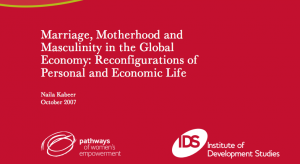‘Marriage, motherhood and masculinity in the global economy: reconfigurations of personal and economic life’ IDS Working Paper No. 200, Brighton
http://www.ids.ac.uk/files/dmfile/Wp290.pdf
The different processes associated with globalisation have led to rising rates of paid work by women often in contexts where male employment is stagnant or declining. This paper explores how women and men are dealing with this feminisation of labour markets in the face of the widespread prevalence of male breadwinner ideologies and the apparent threat to male authority represented by women’s earnings. Responses have varied across the world but there appears to be a remarkable resistance to changes in the domestic division of unpaid work within the household and a continuing failure on the part of policymakers to provide support for women’s care responsibilities, despite the growing importance of their breadwinning roles. Many of the services previously provided on an unpaid basis are being transferred to the paid economy but most working women continue to bear a disproportionate burden of domestic responsibility. There is evidence that women may be using their newly acquired earning power to challenge the injustice of the double work burden in ways that pose a challenge to long-term processes of social reproduction



